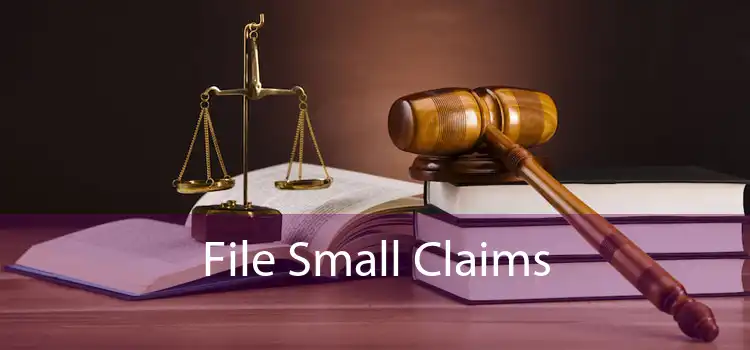Hire Small Claims filing Experts As Our Expert Understand The Complete Small Claims Court Procedure And Process And We Use The Fastest Online Procedure.
If you cannot resolve a dispute with a business or a person and you are looking for a Professional To File A Small Claims Case in small claims court. Small claims court provides you with proper guidelines to file your small claims correctly. Before filing a small claims case in court you must have to figure out the defendant (person or business you are suing). As the case is complicated and you can also help a Small Claims Advisor to make sure you know which court to file your case in. If you are a resident, you have to fill a small claims case and write a demand letter asking for payment of damage.

Then you need to fill out court forms that include a plaintiff's claim and you will give your forms to the court clerk to file your small claims case. Georgia Small Claims serve your claim and be prepared for your Small Claims Case Trial. Make a plan that what you have to say, prepare proof with copies to take for small claims cases, and also take people as witnesses to support your story. Also, following tack ticks are helpful for you to file a small claims case
- How to file a small claim filing.
- Common types of small claims.
- What to expect during a small claim hearing.
- Fun fact, Experts are not allowed at the initial small claims hearing! This is to even the playing field so that each party has an equal chance of obtaining justice.
- How much does going to small claims costs.
How Do I File Small Claims?
You can always sue an individual small claims court. You can always sue a company in Small Claims Court if their business is located in your county.
You May Be Able To Sue Small Claims in Other Situations. For Example:
- If you are suing about a car accident that occurred.
- If you are suing about a security deposit and the leased premises are located.
- If you are suing about damage to your house that occurred.
- If you have an issue with your Landlord returning the security deposit and the rented unit was in County then you would be able to sue your landlord Small Claims Court (you would also be able to sue your landlord in the small claims court in the county where they live).
What Kinds of Cases Go to Small Claims Court?
You can always sue an individual Small Claims Court if they live in your County. You can always sue a company in Small Claims Court if their business is located in your County. Small claims courts can only hear specific types of cases. Most small claims courts can only hear civil cases involving small amounts of money, usually around $10,000 or less. Small Claims Court can Hear Civil Court Cases, such as:
- Breach of contract disputes
- Personal injury claims (such as dog bites)
- Collection on debts or loan repayments
- Professional negligence claims (like bad car repairs)
- Claims regarding the return of a renter's security deposit or personal property
- Issues with contractors or home remodels
- Property damage claims
- Claims involving eviction notices or eviction
- False arrest claims
- Libel or slander cases
Most Small Claims Court does not hear:
- Family cases (divorce, child support issues, guardianships)
- Name changes
- Bankruptcy
- Probate cases
- Personal injury cases with serious injuries or damages
If you have a Small Claims Case Worth More Than $10,000, you need to hire an expert to take it to small claims court.

How Long Do I Have To File A Small Claims Case?
Do not wait to file your small claims in court. After an incident occurs, you only have a set period of time to file your case. If the defendant lives or resides in your county, he must serve the Small Claims Court on the defendant at least 15 days before the hearing. If they live outside of your county you must serve the defendant at least 20 days before the hearing.
How Much Can You Sue For Small Claims Court?
This is also known as the "small claims limit." Small Claims:
- An individual or sole proprietor can sue for $10,000 or less.
- A corporation or LLC can sue for $5,000 or less.
What Are The Small Claims Court Filing Fees?
The amount you will pay to file a small claims depends on how much you are suing for:
- If you are suing for $1,500 or less, then your filing fee is $30.
- If you are suing for more than $1,500 but less than or equal to $5,000, then your filing fee is $50.
- If you are suing for more than $5,000 but less than or equal to $10,000, then your filing fee is $75.
What Are Other Costs For Small Claims Court?
Small claims court handles cases that involve disputes over money or property, usually below a set financial limit. An individual can collect up to $1,000 or less in small claims court, while small businesses and limited liability companies are still limited to $5,000. Keep in mind that the Cost of Hiring An Expert and spending time in civil court can quickly exceed such limits. You can expect to pay:
- Filing fees (see above) $30- $75
- Serving Costs can range from $15-$100
When Will Small Claims Hearing be?
Once a case is filed in small claims court, the hearing will be scheduled within 30- 70 days. You must serve the small claims case on the defendant at least 15 days before the hearing if the defendant lives or resides within the county. If the defendant resides outside of the county, you must serve them at least 20 days before the hearing. Make sure to File "Proof of Service" at least 5 days before the hearing.
How To Prepare For A Small Claims Court Hearing?
If you are unsure about your case, conduct research that applies to your case or Consults A Professional. Prepare your evidence. Invoices, contracts, receipts, etc. You want to have your evidence organized with titles, dates, and why that piece of Evidence is Important. All your evidence should be geared towards showing the judge why you are correct. Prepare what to say. During the hearing, the judge will ask the person suing why they are suing. The judge will then ask the other party for their side of the story.

Get your receipts for costs ready. For example, your filing fees and any process server costs. Make sure to let the judge know that you would like to be Reimbursed For Costs. Print enough copies of all your evidence. You will need at least three copies (one for you, one for the judge, one for the other side). Don't forget that small claims require you to mail your evidence to the court and the other party before the hearing date.
What Happens On The Hearing Date of Small Claims Court?
Give yourself plenty of time. You do not want to be late for your hearing. Give yourself plenty of time for parking and navigating the courthouse. Once You Walk into the Courthouse:
- Once you walk in, the first thing you will see is airport-like security. You will need to put your belongings through the metal detector. You can bring in laptops and cellphones, unlike some courthouses.
- Outside of each courtroom, there will be a printed list of the cases that have hearings on that day.
- You want to locate your case on the schedule. If you don't see your case listed, but you have received notice that your case will be heard that day, you may want to try and speak to the sheriff or clerk in the courtroom. If you are unable to speak to them, go to the small claims court clerk to verify.
- Make sure to use that waiting time to organize your evidence or go to the restroom.
- Once the courtroom is opened, the court clerk, sheriff, and judge will go through what to expect. You will be sitting in a room with other people who have filed small claims cases. You will get to watch the cases before yours. Make sure you are in the courtroom when your case is called!
Small claims Court Mediation Services
Some small claims courts offer free mediation.
- What is mediation? Mediation is a meeting between both the plaintiff (the person suing) and the defendant (the person being sued) conducted by a neutral third party (a mediator). The parties will meet with a mediator, discuss their case, and try to reach a Mutually Beneficial Solution. Both parties must agree to mediation and it cannot be forced on them.
- When will mediation occur? The court clerk, judge, or sheriff will announce if there are mediators available that day. Usually, the judge will tell the audience that if you opt for mediation, you can try to Mediate The Case while other hearings are being conducted. If you finish the mediation early, then you get to "skip the line" and your case is processed faster.
Are Filing Expert Allowed in Small Claims Court?
- Right before the hearing, the judge will ask the parties to show each other the evidence that they have brought with them.
- The Judge will ask the person who is suing why they are suing.
- Then the person who is being sued will get to present their side of the story.
- The hearing will last around 15 minutes.
- The judge will ask the parties to show the judge the evidence they brought with them. Sometimes the judge will keep the evidence other times you will get the evidence right back.
- Very rarely will a judge tell the parties their decision immediately after the hearing? Instead, the judge will tell the parties that the decision will be mailed to them (usually takes a few weeks to two months or so).
- The plaintiff (the person who is suing) has to still prove their case. The plaintiff will have to tell the judge why they are suing and provide enough evidence.
- The case gets dismissed without prejudice (meaning that the plaintiff can still file the case again later on.)
- Experts are not allowed to represent parties at the initial hearing. If the defendant appeals the case, then filing experts are allowed to represent the parties at the appeal hearing.
- You will not be able to hire an expert to represent you at the initial small claims court hearing.
Access Your Small Claims Files Online
Did you know you can view and download filed documents for your small claims court case in the county online? Documents you, the other party, or the court files, will appear in the online case docket. The Online Case Docket consists of a list of "events" in the case. Each time you, the other party, or the court files a document, a new event is created. You are able to access the small claims court case docket for free. If you need to download a document filed in the case, the court charges a fee. You can find a list of fees here.

Translators And County Small Claims Court
Did you know that you can request a free interpreter/translator for your county small claims court case? Whether you are the person who is suing, the person being sued, or Need Interpreter For Your Witness, county small claims courts offer interpreters free of charge.
